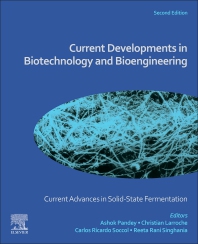Books in Chemical engineering
Books in Chemical engineering
The Chemical Engineering collection offers content that combines research with foundational knowledge, practical information, methods and case studies, in a variety of areas, including biochemical engineering, catalysis, filtration & separation, colloids & surface chemistry, electrochemical engineering, energy & transport processes, materials chemistry, metallurgy, process engineering, safety & reliability, sustainable & environmental, to help chemical engineers address the challenges we face today, including climate change, global warming, health and nutrition, and alternative energy.
- 1st Edition
- September 1, 2025
- Menghe Miao
- English
- Paperback9 7 8 0 4 4 3 2 1 4 6 7 7
- eBook9 7 8 0 4 4 3 2 1 4 6 8 4

Yarn Twisting Dynamics
- 2nd Edition
- September 1, 2025
- Ashok Pandey + 3 more
- English
- Paperback9 7 8 0 4 4 3 2 7 6 2 4 8
- eBook9 7 8 0 4 4 3 2 7 6 2 5 5

Current Advances in Solid-State Fermentation
- 1st Edition
- September 1, 2025
- Mohamed Thariq Hameed Sultan + 4 more
- English
- Paperback9 7 8 0 4 4 3 2 8 8 5 8 6
- eBook9 7 8 0 4 4 3 2 8 8 5 9 3

Damage Analysis of Natural Fiber-reinforced Polymer Biocomposites
- 1st Edition
- Volume 9
- September 1, 2025
- Faisal Irshad Khan + 1 more
- English
- Hardback9 7 8 0 4 4 3 2 9 4 7 4 7
- eBook9 7 8 0 4 4 3 2 9 4 7 5 4

Method of Process Systems in Energy Systems: Emerging Energy Systems Part II
- 1st Edition
- September 1, 2025
- Fuad Khoshnaw
- English
- Paperback9 7 8 0 4 4 3 3 0 0 1 8 9
- eBook9 7 8 0 4 4 3 3 0 0 1 9 6

Corrosion Atlas Case Studies
- 1st Edition
- September 1, 2025
- Meisam Tabatabaei + 3 more
- English
- Paperback9 7 8 0 4 4 3 3 3 0 3 4 6
- eBook9 7 8 0 4 4 3 3 3 0 3 5 3

Aquatic Resource Biorefineries
- 1st Edition
- September 1, 2025
- Li-Zhi Zhang + 3 more
- English
- Paperback9 7 8 0 4 4 3 3 4 1 9 5 3
- eBook9 7 8 0 4 4 3 3 4 1 9 6 0

Membrane and Coating-Based Built Environmental Control Technologies
- 1st Edition
- Volume 65
- September 1, 2025
- Mihir Kumar Purkait + 2 more
- English
- Hardback9 7 8 0 4 4 3 3 4 4 4 5 9
- eBook9 7 8 0 4 4 3 3 4 4 4 6 6

Photocatalytic Degradation of Pharmaceutical Wastewater Part A
- 1st Edition
- August 22, 2025
- Tonni Agustiono Kurniawan + 1 more
- English
- Paperback9 7 8 0 4 4 3 2 3 8 6 1 1
- eBook9 7 8 0 4 4 3 2 3 8 6 2 8

BiOX-based Photocatalysts for Dual Applications
- 1st Edition
- August 8, 2025
- Zeba Khanam + 2 more
- English
- Paperback9 7 8 0 4 4 3 2 3 5 8 2 5
- eBook9 7 8 0 4 4 3 2 3 5 8 1 8
